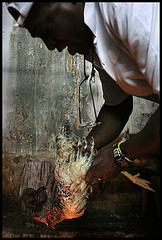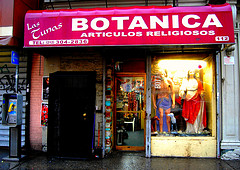Santería is a religion that merges beliefs from Roman Catholic Christianity and Yoruba. It is practiced mostly in West Africa and the Caribbean. Many Puerto Ricans, Dominicans, and Cubans practice Santería. Like any religion, it has unique rituals, ceremonies, and, of course, vocabulary. Here’s a quick guide to some of the words you might encounter in Santería. Remember, there are hundreds of words related to this religion, so these are just some basics!
26 SANTERÍA Vocabulary Words
1. Abbita – Devil
2. Abikú – When a spirit wants to return to the world and kills many children or a name for children prematurely marked by death.
3. Aberinkulo – To scare the dead.
4. Aché – Grace, blessing, Aché pa ti means “good luck”
5. Ache de egun – Blessing of the dead
6. Achupua – Moon
7. Amalá – A dish made with cornmeal, a sort of mutton stew
 8. Babalawo – Father of secrets and mysteries, name of the priest of Ifa
8. Babalawo – Father of secrets and mysteries, name of the priest of Ifa
9. Babalosha – Holy Father
10. Batá, Tambores – Set of three sacred drums used in ceremonies
11. Bembé – Name of a religious celebration with music and dancing. This word is commonly used as synonym for a “party” in Cuba, Dominican Republic and Puerto Rico, for example “Se formó el bembé” that means “The party started.”
12. Biagué – Divination system that uses 4 pieces of coconut
13. Ebó – Cleansing and purification ceremony that can involve simple sacrifices, sometimes of animals.
14. Egún – spirit, death – [Eggun: Ancestors. These are relatives who have died. Where it gets a little more complicated are topics such as adoptive-family and other non-biological people that were viewed as and treated like family. These weren’t really issues from native Yoruba people, of course. Traditionally, eggun are limited to blood-relatives.
15. Ewe – grass, can also refer to the restrictions people put on themselves on their day of Itá
16. Ibaé Bayé Tonú – An expression used to invoke ancestors and ask them for their help and strength before beginning a ceremony
17. Iború, iboyo, ibocheché – A greeting made by the Father of secrets and mysteries in remembrance of 3 women who saved the life of the Orula
18. Ilé Ocha – House of saint, temple
19. Itá – Ceremony where you speak of the past, present, and future.
20. Modyuba or Moyuba – prayer, speaking with reverence,
21. Olofi or Olofin – The supreme god, the King of Kings
22. Olubatá – The musician who plays he complicated rhythms and melodies on the batas in honor of the Orishas
23. Oyubona – Guiding eyes, a type of Santería priestess
24. Patakin or Pataki – Legends and stories, divination systems
25. Sarayeyeo – Purification ceremony that is done with the believer of Santería at the foot of an Orisha
26. Suyere – The song or prayer that honors an Orisha
A ritual in Santería is called a trabajo meaning “a work” and it can be compared to a spell. You can find trabajos for everything to benefit yourself or others. Keep in mind that when you are doing something to benefit yourself, you might be doing something against others. Here is an online document in Spanish called Otras y trabajo de Santería para defenderse with 110 examples of trabajos like:
• To take a person out of jail before being convicted.
• To make someone else sick.
• To attract customer to a place.
• To dominate a man or woman.
 The place to buy materials to do a trabajo is called a botánica. In these stores you will find Catholic religious items such as saint statues and candles mixed with oils, herbs, amulets, fragrances, soaps and much more.
The place to buy materials to do a trabajo is called a botánica. In these stores you will find Catholic religious items such as saint statues and candles mixed with oils, herbs, amulets, fragrances, soaps and much more.
Have you ever attended any Santería ceremonies? Do you have any words to add?
Check out these other articles about the Spanish Language.
Photo credits: By mariana mansur via flickr